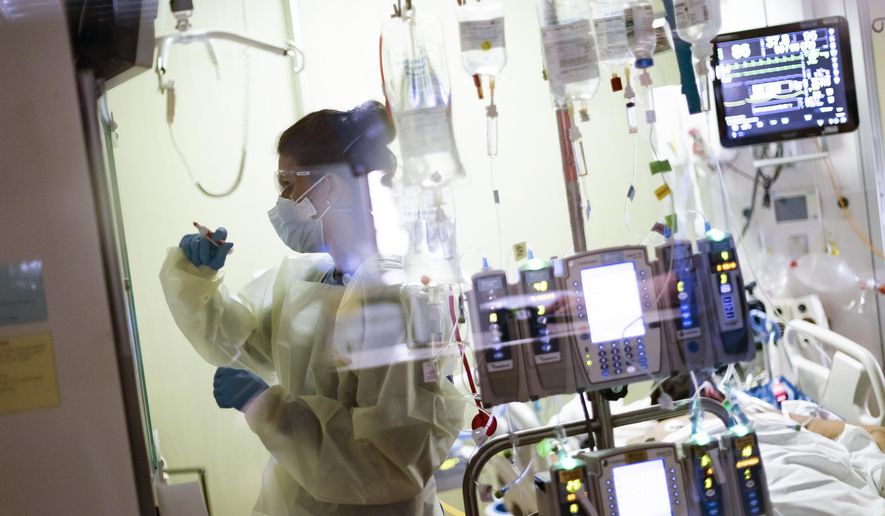Americans who’ve been vaccinated against COVID-19 since June were more likely to point to fear of a fast-moving variant, overcrowded hospitals or the death of a loved one as the motivating factor than employer rules or full approval from the Food and Drug Administration, according to a poll released Tuesday.
The Kaiser Family Foundation found the delta surge was most commonly cited, at 39% of those polled, followed by reports of local hospitals filling up (38%) and knowing someone who became seriously ill or died (36%).
Vaccinations slowed to a trickle in early July after peaking in April, but slowly trended upward after the delta variant’s punch became clear by midsummer across the Sun Belt, where patients in low-vaccination areas told television stations how much they regretted putting off the vaccine.
“Nothing motivates people to get vaccinated quite like the impact of seeing a family member, friend or neighbor die or become seriously ill with COVID-19, or to worry that your hospital might not be able to save your life if you need it,” KFF President and CEO Drew Altman said. “When a theoretical threat becomes a clear and present danger, people are more likely to act to protect themselves and their loved ones.”
Also, 35% pointed to vaccination requirements around activities such as traveling or attending events as the prime motivator.
President Biden is highlighting the full approval of the Pfizer-BioNTech vaccine and a series of vaccine mandates pushed by states and employers as reasons to get vaccinated.
KFF, a nonprofit health policy organization, found those were milder motivators, with 19% citing an employer mandate as the reason they got vaccinated and 15% citing Pfizer’s license from the FDA in late August. Many of the mandates are still being rolled out, however, and companies are waiting for the Occupational Safety and Health Administration to issue rules on large companies that will require vaccination or weekly testing.
The woeful delta surge occurred earlier in the summer, reversing what appeared to be tremendous gains against the virus and putting the pathogen back in the spotlight.
Roughly 55% of the U.S. population is fully vaccinated and around a quarter of those eligible have refused to get at least one dose.
KFF analysts said 73% of Hispanics reported receiving at least one shot compared to 70% of Black Americans and 71% of White Americans, prompting the White House to take a victory lap over its efforts to avoid gaps in uptake.
“The Kaiser data clearly show that our relentless focus on advancing equity, and ensuring our response reaches the hardest-hit communities and those most at-risk has closed the gaps in racial and ethnic vaccination rates,” White House COVID-19 Coordinator Jeff Zients said.
White House officials also said American Indian and indigenous communities and Asian Americans have continually comprised a share of vaccination that exceeds their shares of the U.S. population.
KFF said the “largest remaining gap is between political partisans.”
About 90% of Democrats reported they have gotten at least one dose compared to 58% of Republicans. Sixty-eight percent of independents said they are at least partially vaccinated.
Marcella Nunez-Smith, who chairs Mr. Biden’s health-equity task force, said they won’t give up on conservative and rural adults but said they will double down on an existing strategy of relying on local messengers such as faith leaders.
“It might take a little bit longer but we are absolutely laser-focused on reaching everyone, making sure people know the vaccines do work, are safe and effective,” she said. “This is not a political or partisan issue in the least, it’s a public health crisis and we have the tools that we know work to get us all safely through and to the other side.”
A top Republican, Senate Minority Leader Mitch McConnell, has been a vocal advocate for the vaccines and said Monday he received a Pfizer booster shot because he is eligible under the FDA’s recent approval.
KFF found 62% of people view the development of boosters positively, or that it “shows that scientists are continuing to find ways to make vaccines more effective.”
However, 78% of vaccinated persons feel that way versus only 22% of unvaccinated persons. More than seven in 10 unvaccinated persons think the booster program is a sign “that the vaccines are not working as well as promised.”
Dr. Nunez-Smith said the primary focus on the vaccine campaign will center on getting people vaccinated for the first time to stave off the worst outcomes from the virus despite concerns about waning immunity down the road.
“People who are vaccinated now are protected against illness, the most severe outcomes from COVID-19,” she said.
Majorities of both vaccinated and unvaccinated adults — about eight in 10 people overall — think COVID-19 will stick around. They expect it to “continue at a lower level and be something the U.S. will learn to live with and manage with medical treatments and vaccines, like the seasonal flu.”
Only 14% think it can be largely eradicated in the U.S. like polio.
• Tom Howell Jr. can be reached at thowell@washingtontimes.com.




Please read our comment policy before commenting.